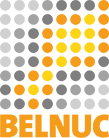BELNUC COVID-19 recommendations (update 24/4/2020)
COVID-19 – Recommendations for the organization of care in nuclear medicine
Based on the recommendations published by CNP (“Conseil National Professionnel de Médecine Nucléaire, France”)
Introduction
The COVID-19 outbreak is going to put extreme strain on the healthcare system. Nuclear medicine is mostly an outpatient activity (95% of the activity) important for the diagnosis and follow-up of multiple conditions. Considering the high risk of contamination of potentially at-risk patients and contamination of patients to the nursing staff, delaying certain non-urgent diagnostic tests is desirable.
Treatment activities pose specific problems related to the management of infectious and radiation safety risks in a patient potentially infected with COVID-19 or at risk of becoming infected during hospitalization. Elective treatments should be deferred. There is also the issue of mandatory hospitalization for the administration of certain radiopharmaceuticals which, given that the radiation safety risk to the public is negligible, could be administered on an outpatient basis.
Finally, the possibility of repurposing shielded therapy rooms for the care of all patients, whatever their pathology, must be anticipated. This implies obtaining exceptions from regulatory authorities if this requires deviations from applicable regulations.
Diagnostic activities
Postponing all non-urgent examinations with no immediate impact on the management of the patient in particular:
- Surveillance myocardial scans
- Renal scans
- Surveillance FDG, 18F-Choline and 68Ga-PSMA PET scans
- Surveillance oncology bone scans
- Brain scans (PET and SPECT)
- Parathyroid adenoma scintigraphy
- Gastric emptying
- Blood volume measurement
- Bone mineral density
Examinations with impact on patient management, or risk of loss of treatment opportunities should be performed in particular:
- PET scans for tumor characterization, staging and evaluation of the therapeutic response
- Diagnostic myocardial scintigraphy if there is an a priori probability of intermediate level myocardial ischemia.
- Sentinel node localization using scintigraphy
- Pulmonary scan
- Search for sites of infection (PET or SPECT)
- Bone scan on a case-by-case basis
- Thyroid scan on a case-by-case basis
An increase in pulmonary scans is expected and has already been observed in some departments. These are either suspicion of pulmonary embolism in COVID-19 infected patients, or suspicion of COVID-19 infection, or requests for examinations to relieve the radiology departments. A dedicated circuit for the management of patients requiring pulmonary scans must be set up if the configuration of the department allows it. Hybrid SPECT/CT or PET/CT scanners can be reconfigured in case of emergency to perform stand-alone CT scans in case radiology departments are unable to cope with demands.
We invite all departments to set up procedures for cleaning the examination rooms between each examination (of the Multi-Resistant Bacteria type) and in accordance with the recommendations of the local hospital.
Therapy activities
- Continue outpatient therapy for Lutathera® and 177Lu-PSMA, subject to the authorisation of the authorities
- Postpone 131I therapy in patients undergoing Thyrogen® for thyroid cancer treatment
- Continue 131I therapy in patients undergoing withdrawal for thyroid cancer treatment
- Exceptional authorisation to admit patients in a dedicated nuclear medicine treatment wards with or without the presence of radioactive patients, subject to the authorisation of the authorities if this requires deviations from applicable regulations.
These recommendations may be updated as the epidemic evolves and the healthcare system becomes saturated. The nuclear medicine teams are entirely free to follow or not to follow these recommendations.
More information
- BELNUC Paper of the Month April 2020: COVID19 – Nuclear Medicine Departments, be prepared! (members only)
- BELNUC Library (members only)
- Beware of possible COVID-19 related chest CT abnormalities on hybrid imaging studies
- Recommendations for performing V/Q scans in the context of COVID-19
- Regularly check the information posted by the Belgian governments on www.info-coronavirus.be and www.sciensano.be.
Contact information FANC/AFCN
If the COVID-19 crisis requires exceptional deviations from applicable regulations, you are strongly encouraged to contact the competent authorities (FANC/AFCN) on +32 (0)2 289 21 11 or meldpunt@fanc.fgov.be or pointcontact@fanc.fgov.be.

